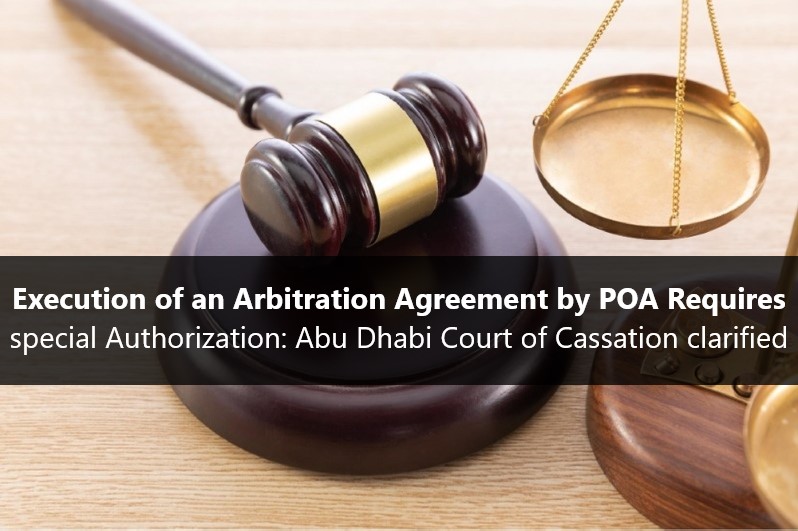In a recent decision by the Abu Dhabi Court of Cassation in Case No. 922 of 2020, the Court established that an arbitration agreement entered into by a representative on behalf of a party would be valid only if the representative acts according to a Power of Attorney (POA). Such terms of POA must be stated explicitly to confer an exclusive power to do so (i.e. an authority to enter into an arbitration agreement).
Legal Provision involved in the case
Article 58(2) of the UAE Civil Procedures Law was the primary provision involved in the current case. It states that no admission or waiver of a right, settlement, or submission to Arbitration may be undertaken without specific authority.
You should read: NON-ARBITRAL DISPUTES UNDER ARBITRATION LAW IN UAE
Factual Background of the Case
- A contractor engaged in two subcontracts for construction work with a subcontractor. Both Subcontracts had arbitration clauses.
- The Subcontractor’s Representative (Representative), acting under a properly notarized Power of Attorney (Original POA), signed the Subcontracts on behalf of the Subcontractor.
- The Original POA gave the appointed Representative absolute power and authority to act on behalf of the Sub-contractor.
- The Power of Attorney (POA) did not provide the Representative an explicit authority to act on behalf of the Subcontractor on Arbitration agreement (as a mode of dispute resolution) in accordance with Article 58(2) of the UAE Civil Procedures Law.
- A few years later, following completion of the work mentioned in the Subcontracts, the Subcontractor issued to its Representative another Power of Attorney (Subsequent POA).
- It was agreed in the Subsequent POA that the Representative would have complete control over the company and would be able to perform all of the acts specified in Article 58(2) of the UAE Civil Procedures Law, which included the authority to obligate the Subcontractor to arbitration agreements.
- There was a dispute about the Contractor’s failure to make due payments under the Subcontracts, which resulted in the filing of civil proceedings before the Abu Dhabi Court of First Instance.
- The contention of Contractor
The Contractor challenged the petition and contended that the Court lacked jurisdiction to hear the matter since the parties’ subcontracts were subject to Arbitration.
- Decision of Abu Dhabi Court of First Instance
The Court agreed with the Contractor’s argument and dismissed the lawsuit because the subcontract was subject to an arbitration agreement. As a result, this Court lacked the jurisdiction to resolve the dispute.
- Decision of Abu Dhabi Court of Appeals
The sub-contractor filed an Appeal before the Abu Dhabi Court of Appeals and challenged the Abu Dhabi Court of First Instance decision. The Court of Appeals affirmed the judgement of the Court of First Instance. It ruled that the Subsequent POA ratified the previous Arbitration Agreements. Such ratification gave the Representative the power to execute the acts as set out in Article 58(2) of the UAE Civil Procedures Law.
Subsequently, the Subcontractor filed an appeal with the Court of Cassation.
- Arguments made by Subcontractor
The Subcontractor then filed an appeal with the Court of Cassation, claiming that the arbitration agreements were invalid and unenforceable because the Representative lacked the necessary power to agree to Arbitration.
- Decision of Court of Cassation
The Court of Cassation overturned the decision of the Court of Appeal and declared the Arbitration Agreements as null and invalid. The Court determined that the Representative lacks authority to bind the Subcontractor to the arbitration agreement of subcontracts. As a result, the Court overturned the Appeals Court’s judgement and returned the case to the Court of First Instance to consider the merits.
- Findings of the Court
- The Court found that an arbitration agreement is effective only if it is formed by a party who can exercise this right. Any arbitration agreement reached without such authorization is null and invalid.
- The Court of Cassation determined that the Representative lacked the power to settle disputes through Arbitration when signed the Subcontracts.
- The Court of Cassation rejected the notion that the Subsequent POA was issued to affirm the Representative’s power to sign the Subcontracts and serves as post-arbitration ratification of the Arbitration Agreements. While it is possible to ratify an existing arbitration agreement, this didn’t happen in this instance. The Subsequent POA was awarded after the conclusion of the Subcontractor’s work and was limited to new contracts. Thus, it cannot be applied retrospectively.
You should know: HOW TO ENSURE ABOUT THE VALIDITY OF ARBITRATION AGREEMENT IN UAE
Conclusion
The judgement of the Abu Dhabi Court of Cassation in this instance indicates that the power given under a POA shall be carefully construed. If any doubt arises regarding the Representative’s capacity to participate in an arbitration agreement, such arbitration agreement is considered null and unenforceable.
The purpose of this article is to provide a general overview. Any party wishes to give their Representative the power to enter into arbitration agreements on its behalf. In that case, such authority should be expressed clearly and explicitly in the POA. . It is strongly recommended that you get the assistance of a competent lawyer while writing a POA to prevent any challenges to the enforceability of an arbitration agreement.
HHS Lawyers and Legal Consultants’ attorneys are incredibly proficient in drafting POAs. Should you more about the case, don’t hesitate to contact us.
Reference:
https://www.natlawreview.com/article/abu-dhabi-court-cassation-confirms-representatives-acting-under-power-attorney-must

